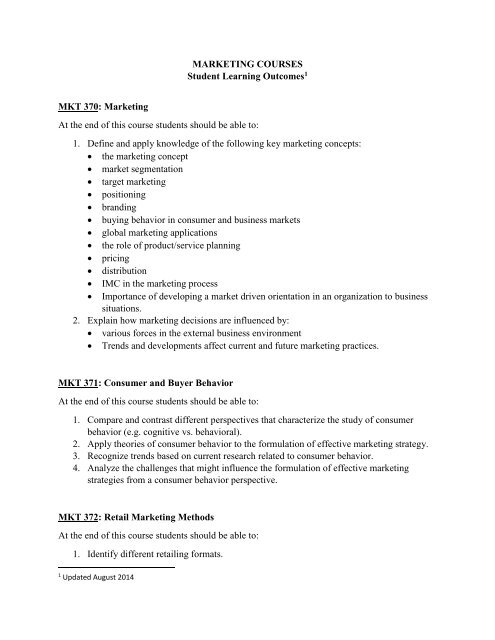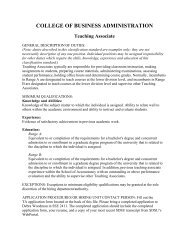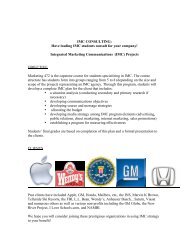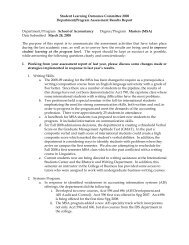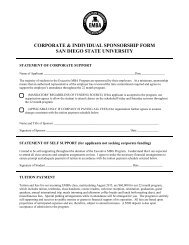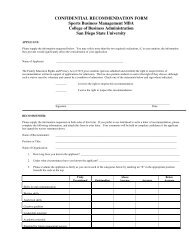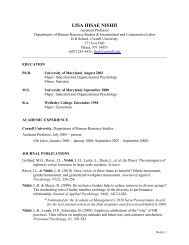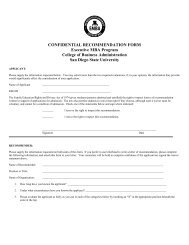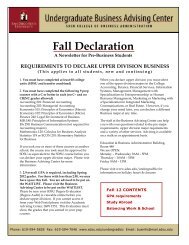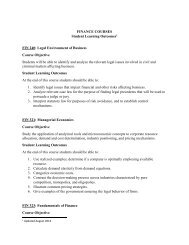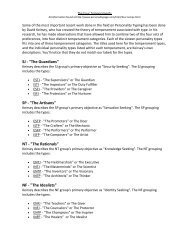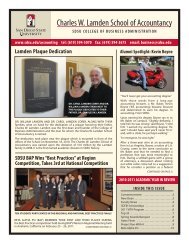MARKETING COURSES – Student Learning Outcomes
MARKETING COURSES – Student Learning Outcomes
MARKETING COURSES – Student Learning Outcomes
You also want an ePaper? Increase the reach of your titles
YUMPU automatically turns print PDFs into web optimized ePapers that Google loves.
<strong>MARKETING</strong> <strong>COURSES</strong><br />
<strong>Student</strong> <strong>Learning</strong> <strong>Outcomes</strong> 1<br />
MKT 370: Marketing<br />
At the end of this course students should be able to:<br />
1. Define and apply knowledge of the following key marketing concepts:<br />
the marketing concept<br />
market segmentation<br />
target marketing<br />
positioning<br />
branding<br />
buying behavior in consumer and business markets<br />
global marketing applications<br />
the role of product/service planning<br />
pricing<br />
distribution<br />
IMC in the marketing process<br />
Importance of developing a market driven orientation in an organization to business<br />
situations.<br />
2. Explain how marketing decisions are influenced by:<br />
various forces in the external business environment<br />
Trends and developments affect current and future marketing practices.<br />
MKT 371: Consumer and Buyer Behavior<br />
At the end of this course students should be able to:<br />
1. Compare and contrast different perspectives that characterize the study of consumer<br />
behavior (e.g. cognitive vs. behavioral).<br />
2. Apply theories of consumer behavior to the formulation of effective marketing strategy.<br />
3. Recognize trends based on current research related to consumer behavior.<br />
4. Analyze the challenges that might influence the formulation of effective marketing<br />
strategies from a consumer behavior perspective.<br />
MKT 372: Retail Marketing Methods<br />
At the end of this course students should be able to:<br />
1. Identify different retailing formats.<br />
1<br />
Updated August 2014
2. Analyze consumer evaluations of retail offerings.<br />
3. Conduct an in-depth retailer analysis.<br />
4. Formulate retail marketing strategies.<br />
5. Apply retail management concepts and practices to real world situations.<br />
MKT 373: Integrated Marketing Communications<br />
At the end of this course students should be able to:<br />
1. Explain the role of IMC in the overall marketing program.<br />
2. Describe the structure for developing an IMC plan.<br />
3. Discuss how consumer behavior and communications theories lead to the development of<br />
communications objectives.<br />
4. Differentiate between communications objectives and marketing objectives.<br />
5. Measure the effectiveness of an IMC program.<br />
MKT 376: Global Marketing Strategy<br />
At the end of this course students should be able to:<br />
1. Identify the differences between marketing at home and marketing in an international<br />
environment.<br />
2. Adapt existing knowledge to satisfy international market entry requirements.<br />
3. Assess and contrast cultural, economic, political and legal differences between home and<br />
global markets and across potentially viable international markets.<br />
4. Adapt existing marketing strategy to comply with international market conditions.<br />
5. Conduct international market segmentation, targeting and product positioning in target<br />
market.<br />
6. Decide on pricing, promotion, advertising, distribution, product and other relevant<br />
marketing factors that will allow for success in international markets and for stronger<br />
competitive positioning in the global marketplace.<br />
7. Develop a set of criteria to continuously monitor international marketing opportunities, to<br />
measure marketing success and to determine strategic adjustments.<br />
MKT 377: Selling Strategy and Practices:<br />
At the end of this course students will be able to:<br />
1. Discuss how selling plays a key role in all industries.<br />
2. Explain how a career in sales could be very lucrative and describe how the intensity of<br />
their efforts will usually coincide with their results and success.<br />
3. Identify how to successfully implement the 8-Step Sales Cycle Process.
4. Describe the significant responsibilities that a salesperson faces as the KEY<br />
individual/point of contact representing a specific company or service within the<br />
marketplace.<br />
5. Identify and discuss a wide range of interesting and dynamic sales professions within the<br />
for-profit and non-profit sectors of the economy.<br />
6. Utilize sales skills.<br />
7. Use oral communication skills.<br />
MKT 380: Direct Marketing<br />
At the end of this course students should be able to:<br />
1. Identify the significant range of media options available within the sphere of direct<br />
marketing and describe the advantages, disadvantages and limitations of each one.<br />
2. Communicate with clients using direct marketing industry terms.<br />
3. Discuss the main elements that go into developing a successful direct marketing program<br />
or campaign including strategic development, market research, creative analysis, program<br />
implementation and measurement.<br />
4. Evaluate and communicate the overall effectiveness of a direct marketing campaign via<br />
return-on-investment (ROI) analysis and other quantifiable measurements.<br />
5. “Brainstorm” and solve marketing challenges.<br />
6. Develop and execute a “mini” Direct Marketing program for a real company’s product or<br />
service and then present the campaign and creative strategy.<br />
7. Use oral communication skills.<br />
MKT 470: Marketing Research<br />
At the end of this course students should be able to:<br />
1. Describe marketing research, what kinds of information it can provide, and how it is used<br />
by marketing management.<br />
2. Identify and explain alternative research methods and their relative strengths and<br />
weaknesses.<br />
3. Identify and describe examine major types of measurement techniques and data<br />
collection methods.<br />
4. Analyze data obtained through marketing research using the SPSS software.<br />
5. Write a marketing research report and make an oral presentation of the research results.<br />
6. Make sound tactical and strategic business decisions based on the proper interpretation of<br />
marketing research results.<br />
MKT 472: Advanced Marketing Strategy
At the end of this course students should be able to:<br />
1. Develop a comprehensive IMC plan.<br />
2. Identify and analyze the strengths, weaknesses, opportunities, and threats faced by an<br />
organization as it prepares to develop an IMC plan.<br />
3. State communications objectives that will guide IMC promotional plan development.<br />
4. Determine and allocate a promotional budget.<br />
5. Plan a media strategy.<br />
6. Measure the effectiveness of the IMC plan.<br />
MKT 473: Sales Management<br />
At the end of this course students should be able to:<br />
1. Discuss how Sales and Sales Management plays a key role within various aspects of all<br />
industries.<br />
2. Explain how a career in Sales / Sales Management could be very lucrative and describe<br />
how the intensity of their efforts will usually coincide with their results and success.<br />
3. Identify how to implement successful Sales Management practices.<br />
4. Describe the significant Sales and Sales Management responsibilities that a<br />
salesperson/Manager faces as the KEY individual / point of contact representing a<br />
specific company or service within the marketplace.<br />
5. Identify and discuss a wide range of interesting and dynamic sales professions within the<br />
for-profit and non-profit sectors of the economy.<br />
6. Participate in a group sales project where students will have the opportunity to<br />
demonstrate their newly acquired sales skills in conjunction with and in front of their<br />
fellow classmates.<br />
7. Improve upon oral and written skills via in-class participation and role-playing.<br />
8. Display confidence that shows fear of selling has been overcome.<br />
MKT 475: Global Marketing Applications<br />
At the end of this course students should be able to:<br />
1. Explain key concepts of global marketing such as:<br />
Application of the marketing concept to diverse cultures.<br />
Positioning the same product or service in different cultural markets.<br />
2. Analyze consumer behavior in global markets in terms of:<br />
Cross-cultural values: collectivism, power distance, masculinity, and uncertainty<br />
avoidance.<br />
Group influences, including sub-cultures, social class, reference groups, and families<br />
on buying behavior.
Individual or psychological influences such as motivation, learning theory,<br />
perception, and attitude formation on buying behavior.<br />
Consumer decision-making processes and the pattern of diffusion of innovation in the<br />
host culture.<br />
Buyer behavior in consumer and industrial markets, the role of the product/service<br />
planning, pricing, distribution, and promotion in the marketing process, the ability to<br />
apply these concepts to global markets.<br />
3. Create marketing plans in foreign markets that adjust the marketing mix appropriate for<br />
the host culture including:<br />
Product and packaging design and crafting the appropriate features and benefits for<br />
the country.<br />
Adapting brand images, archetypes and related symbols, icons, spokespeople, designs<br />
and logos appropriately to diverse global markets.<br />
Establishing the pricing strategies relevant for the host market.<br />
Selection of the optimal distribution channel in foreign markets.<br />
Creation of an IMC that best communicates with target consumers in the foreign<br />
market.<br />
4. Identify and employ secondary sources of global economic information to analyze<br />
markets and customers.<br />
MKT 476: Internet/Interactive Marketing<br />
At the end of this course students should be able to:<br />
1. Summarize key historical media, technology, and marketing milestones.<br />
2. Recognize terminology referencing the infrastructure of digital networked environment,<br />
interface design, online consumer behavior, online advertising/communication, social<br />
media, and industry leaders/organizations.<br />
3. Produce persuasion based multi-media and design interactive communication units.<br />
4. Develop, monitor, and assess digital networked communication/marketing campaigns.<br />
5. Interpret, integrate and critique analyses and predictions regarding social, cultural and<br />
economic trends and transformations related to the digital networked environment.<br />
MKT 477: Marketing Consulting for Small Business<br />
At the end of this course students should be able to:<br />
1. Summarize the organizational managerial context of the business decision.<br />
2. Determine the appropriate information needed to arrive at business recommendations.<br />
3. Determine the methodologies needed to obtain the required information from both<br />
primary and secondary sources.<br />
4. Implement the appropriate methodologies in a semester-long research project.
5. Analyze the collected information to arrive at sound managerial recommendations.<br />
6. Write a sound research report for presentation to management.<br />
7. Orally present the research results to management in a well-organized presentation.<br />
8. Act as a productive member of a team tasked with solving a decision problem.<br />
9. Mitigate interpersonal problems that exist in the research team setting.<br />
MKT 479: Strategic Marketing Management<br />
At the end of this course students should be able to:<br />
1. Discuss the goals of marketing strategy as they pertain to strengthening brands.<br />
2. Identify strategic issues and alternative approaches to addressing these issues.<br />
3. Analyze how marketing decisions are influenced by forces in the external environment.<br />
4. Identify the core competencies and weakness of firms in the context of the strategic issue.<br />
5. Evaluate alternative solutions to marketing problems.<br />
6. Recommend marketing strategies that align forces in the external environment with the<br />
core competencies of the firm.<br />
MKT 496: Marketing and Sales Analytics<br />
At the end of this course students should be able to:<br />
1. Accurately articulate how modern organizations are using “big data” and analytics to (a)<br />
solve old marketing problems in news ways and (b) pursue new marketing opportunities.<br />
2. Use analytic approaches to transform marketing and sales data into actionable and<br />
appropriate marketing decisions.<br />
3. Accurately articulate how to translate typical marketing and sales problems into problems<br />
amendable to being solved with common marketing models.<br />
4. Justify the use of a particular marketing analytics approach and communicate its<br />
managerial implications to a non-technical audience.<br />
5. Use fundamental web analytics principles and tools to monitor and improve digital and<br />
social media marketing campaigns and ecommerce websites.<br />
BA 627: Marketing<br />
At the end of this course students should be able to:<br />
1. Analyze markets and customers utilizing primary and secondary sources of information.<br />
2. Define and apply knowledge of key concepts such as:<br />
Market Segmentation<br />
Target Market selection<br />
Positioning.
3. Identify and explain the elements of the marketing mix and be able to discuss how they<br />
are integrated into a comprehensive plan.<br />
4. Explain the value of building a brand and the necessary steps required to accomplish and<br />
maintain a successful brand in the market.<br />
5. List and describe the elements of an Integrated Marketing Communications program and<br />
discuss how to assure synergy from one communications tool to another.<br />
MKT 701: Seminar in Marketing Planning and Programs<br />
(Course not currently being offered)<br />
At the end of this course students should be able to:<br />
1. Assess environmental influences on firms, particularly competition and customers.<br />
2. Assess the core competency of firms and their relative strengths and weaknesses.<br />
3. Identify those strategies and tactics that best fit a firm’s competitive situation.<br />
MKT 761: Product Innovation Management<br />
At the end of this course students should be able to:<br />
1. Identify and explain the steps in the New Product process and the role of each.<br />
2. Describe the various methods used to generate new products and translate them into New<br />
Product Concepts.<br />
3. List the different research methods used to test the viability of new products in the market<br />
place.<br />
4. Develop a comprehensive new product marketing plan starting with ideation through to<br />
the completion of the proposed marketing mix.<br />
MKT 762: Seminar in Integrated Marketing Communications<br />
At the end of this course students should be able to:<br />
1. Describe how integrated marketing communications has evolved, how it differs from<br />
traditional media advertising, and its role in the marketing program.<br />
2. Evaluate the way marketers organize for integrated marketing communications and<br />
describe the role and function of advertising agencies, media specialist companies, and<br />
other marketing communications organizations.<br />
3. Describe the consumer decision making process and the role consumer behavior plays in<br />
the development of integrated marketing communication programs.<br />
4. Explain the process of developing and implementing media strategies and identify the<br />
advantages and limitations of various media including print, broadcast, and alternative<br />
media.
5. Explain the various promotional tools and the role they play in an integrated marketing<br />
communications program including advertising, sales promotion, public relations, direct<br />
marketing, the Internet, personal selling and other IMC tools.<br />
6. Explain how organizations measure the effectiveness of their integrated marketing<br />
communication programs and ways of determining return on investment.<br />
7. Identify and evaluate integrated marketing challenges facing companies and recommend<br />
solutions and courses of action.<br />
MKT 763: Seminar in Sales Management<br />
(Course not currently being offered)<br />
At the end of this course students should be able to:<br />
1. Explain the strategic role personal selling and sales management play in the marketing<br />
mix and the organization’s strategic plans.<br />
2. Illustrate the steps in the sales process from prospecting to closing.<br />
3. Recruit, select and train sales personnel.<br />
4. Organize a sales force and allocate sales personnel to territories.<br />
5. Develop sales forecasts using objective and subjective methods and models.<br />
6. Use the tools available to the sales manager for motivating and compensating the sales<br />
force.<br />
7. Perform marketing cost analysis to isolate the costs incurred in producing various levels<br />
of sales.Apply techniques for controlling sales force performance and behavior.<br />
MKT 766: Seminar in Marketing Research<br />
At the end of this course students should be able to:<br />
1. Describe what marketing research is, what kinds of information it can provide, and how it<br />
is used by marketing management.<br />
2. Identify and explain alternative research methods and their relative strengths and<br />
weaknesses. Additionally, be able to determine which marketing research methods will<br />
be suitable to analyze which types of marketing problems.<br />
3. Identify and describe major types of measurement techniques and data collection<br />
methods.<br />
4. Analyze data obtained through marketing research using the SPSS software.<br />
5. Write a marketing research report and make an oral presentation of the research results.<br />
6. Design and conduct a real-world marketing research project.<br />
MKT 768: Seminar in Internet Marketing and E-Business<br />
At the end of this course students should be able to:
1. Summarize key historical media, technology, and marketing milestones.<br />
2. Characterize online consumer behavior, online advertising/communication, and social<br />
media.<br />
3. Evaluate industry leaders/organizations best practices and decentralized business models.<br />
4. Develop, monitor, and assess digital networked communication/marketing campaigns.<br />
5. Engage in Search Engine Optimization, Search Engine Marketing, Social Media<br />
Optimization, and Contextual Marketing.<br />
6. Interpret, integrate and critique analyses regarding social, cultural and economic trends<br />
and transformations related to the digital networked environment.<br />
7. Predict mega trends associated with the digital networked environment.<br />
MKT 769: Seminar in International Marketing<br />
At the end of this course students should be able to:<br />
1. Analyze the internal corporate structure and determine if the company is ready to enter<br />
the international markets.<br />
2. Apply the appropriate environmental analytical methods to segment the global<br />
marketplace and prioritize their target countries to enter.<br />
3. Decide on the most appropriate international marketing entry method for their<br />
international target markets.<br />
4. Develop an optimal international marketing strategy that best meets their internal<br />
corporate capabilities and the external environments in the target markets.<br />
MKT 772: Strategic Brand Management<br />
At the end of this course students should be able to:<br />
1. Differentiate a great brand from other brands.<br />
2. Define branding terminology.<br />
3. Explain the concepts of brand creation and brand positioning.<br />
4. Apply the brand positioning framework to:<br />
Develop a brand.<br />
Keep an existing successful brand relevant.<br />
Develop long term, sustainable brand strategies.<br />
Expand a brand internationally.<br />
Reposition a brand.<br />
MKT 779: Advanced Marketing Strategy<br />
At the end of this course students should be able to:
1. Explain how the development of corporate strategy is influenced by strategic marketing<br />
considerations.<br />
2. Describe the process used by companies to develop, implement and evaluate marketing<br />
strategies.<br />
3. Identify the range of problems and decisions implicit in strategic market planning and<br />
ways of achieving a sustainable competitive advantage in the marketplace.<br />
4. Identify various ways companies can develop and utilize specific sources of competitive<br />
advantage.<br />
5. Utilize various contemporary theories, tools and techniques for marking strategic<br />
marketing planning decisions.<br />
MKT 790: Directed Readings in Marketing<br />
At the end of this course students should be able to:<br />
1. Explain how marketing decisions for a specific company or organization are influenced<br />
by various forces in the external environment.<br />
2. Analyze significant trends and developments in a market using primary and/or secondary<br />
sources of information and explain how they impact the marketing strategy and plan of a<br />
company or organization.<br />
3. Explain how a company or organization can segment its market, identify a specific target<br />
market and develop an appropriate branding and positioning strategy.<br />
4. Develop a marketing plan that includes the various marketing mix elements of<br />
product/service planning, pricing, distribution and promotion.<br />
5. Explain how a company or organization will implement and evaluate a comprehensive<br />
marketing program.


